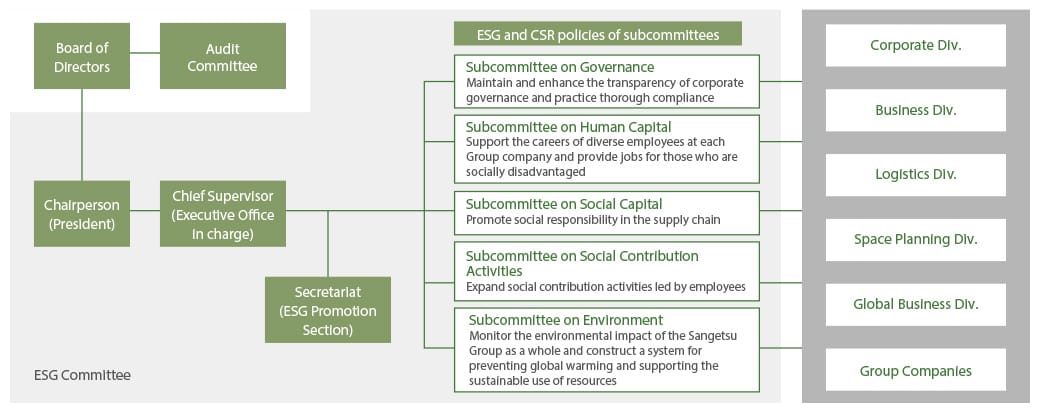
ESG management
Message from Executive Officer in Charge of ESG

Executive Officer, General Manager of Corporate Division Shigenobu Maki
Continue taking on the challenge of resolving social issues from an ESG perspective in order to achieve sustainable growth
The Sangetsu Group believes that incorporating ESG (Environmental, Social, and Governance) perspectives into management is essential for achieving sustainable growth even in an era of increasing uncertainty and difficulty in predicting the future. This is because we consider engaging in businesses that contribute to resolving environmental and social issues, increasing social and economic value, and operating a corporate governance system that allows decisions to be made based on the perspectives of various stakeholders to be essential for achieving sustainable growth. In social issues, there is a limit to the extent that such issues can be resolved through the efforts of a single company alone. In addition to building an even stronger cooperation framework with group companies, we will be coordinating efforts with a diverse range of partners, including suppliers, customers, industry associations, NGOs/NPOs, municipalities and local governments, and local communities, to integrate our mutual knowledge and strengths for resolving a broader range of social issues. It is also important to disclose our own ESG information externally in a timely and appropriate manner. The reason for this is because it increases management transparency, and being able to receive evaluations and feedback from various stakeholders allows us to recognize the level of our company’s efforts in an objective manner and lead them to improvements. More recently, we have been enhancing dialogue with our shareholders and investors, and going forward we will increase dialogue on ESG-related topics to broaden the scope of discussions on management strategies from a more medium- to long-term perspective. We have identified materiality based on social demands and key industry topics, with the ESG Committee that is chaired by the President and CEO deciding on the direction of measures and managing the progress of indicators. When it comes to the environment, we are working on energy savings, energy creation, renewable energy, and carbon offset to achieve carbon neutrality for Sangetsu alone by FY2029, and achieving the Sangetsu Group’s GHG emissions (Scope 1 & 2) reduction target of “55% reduction in FY2029 (compared with FY2021)” based on the term of the Paris Agreement. During FY2023, we installed solar power generation systems at our logistics facilities for on-site consumption, and also began self-wheeling of some of the generated electricity to be used at our headquarters, as a way of contributing to emissions reduction. Future challenges will be promoting efforts toward reducing GHG emissions at group companies, and organizing activities involving the supply chain for reducing Scope 3 GHG emissions. Another challenge is the development of products with low environmental burdens, and we are focusing on product development from the standpoint of energy savings, resource conservation and longer life. In terms of society, supporting expansion, advancement, and active utilization of human capital has been put forth as a key measure in our Medium-term Business Plan [BX 2025]. In addition to setting quantitative targets related to employee engagement as KPIs, we will also be focusing on cultivating a sense of ownership of employees’ careers, expanding education and training programs, promoting employee health and Diversity, Equity and Inclusion (DE&I), and improving the workplace environment by upgrading offices for creating an environment where employees are able to maximize their capabilities in a confident manner. We are also recognizing that issues stemming from economic disparity are becoming more apparent in society, and that it is our corporate responsibility to help resolve these issues through our business activities and social contribution efforts. From FY2023, we started providing new forms of support to organizations that are involved in resolving social issues, and will focusing on ongoing measures that will contribute to resolving issues. When it comes to governance, we have specified corporate governance that is independent, objective and transparent as our materiality, and we are increasing the diversity of skills and gender to improve the effectiveness of the Board of Directors. During FY2023, we focused on improving the quantity and quality of IR activities, such as increasing the number of IR interviews and holding round table meetings between institutional investors and Audit and Supervisory Committee Members to remain committed to enhancing Sangetsu’s corporate value over the medium to long term. In a rapidly changing business environment, we will continue taking on the challenge of resolving social issues from an ESG perspective and focus on enhancing social and economic value while also contributing to the SDGs.
Sangetsu Group’s Basic CSR Policy
A company is a public entity acting within society that seeks to earn profit through sound business activities and offer returns to support vigorous development and society as a whole. With this understanding, the Sangetsu Group works to enrich living environments and contribute to society by providing products and services of value.
We will uphold the following five principles as it pursues its business activities regardless of location: demonstrating respect for basic human rights; complying with the letter and spirit of all laws, regulations and international rules; and taking action to realize sustainable development on its own initiative, guided by its social conscience.
1. To Remain a Trusted Company
We will enhance the brand value of the Sangetsu Group and earn customer satisfaction and trust by developing and providing creative, high-quality designs, for comfortable and rich living spaces, and products and services, with due consideration for safety and the protection of personal information and customer data.
2. To Fulfill our Corporate Social Responsibility
We will communicate with various constituencies in society, including customers, business partners, shareholders and investors, residents of local communities, and employees, and disclose corporate information in an appropriate and fair manner. Also, we will engage in activities that benefit society as an upstanding corporate citizen.
Furthermore, we will comply with laws, regulations and other rules, engage in fair, transparent and free competition, conduct business appropriately, and maintain sound and normal relations with political representatives and governments. At the same time, we will avoid any involvement with antisocial forces or groups that pose a threat to the order, safety or security of civil society.
3. To Provide a Lively Workplace for Employees
We will respect the diversity, personality and individuality of employees. Also, we will properly manage a personnel system that allows each employee to demonstrate their abilities and play a lead role in corporate management while securing a safe, healthy and pleasant working environment.
4. To Protect the Global Environment
We will be proactive and lead the way with the awareness that efforts to address global environmental issues constitute an essential element of the existence and activities of any company.
5. To Earn Society’s Trust and Support
Our top management will lead by example, fully aware of its responsibility to realize the spirit of this charter and ensure that it is thoroughly understood company-wide. It will also constantly monitor feedback from both inside and outside the company to establish an effective corporate system and ensure thorough compliance.
In the event of a violation of this charter, the executive manager will demonstrate personal responsibility in the eyes of the company and the public for taking the initiative in resolving issues and will endeavor to determine their cause and prevent recurrence. The executive manager will also fulfill the duties of promptly disclosing accurate information to the public and of accountability, clarifying the authority and responsibility with regard to the issue, while implementing rigorous measures including those related to the executive office.
ESG Management System
In order to fulfill our corporate social responsibility, in April 2016 Sangetsu established a new CSR Promotion Section, and in April 2017 a CSR Committee was established to oversee CSR activity across the entire Company, with the Company President acting as Committee Chairperson.
Effective from November 2021, the CSR Promotion Section and CSR Committee have been renamed as the ESG Promotion Section and ESG Committee for the purpose of making it clear that they serve as units engaged in overall ESG promotion.
Recognizing the need to respond appropriately to the various international guidelines relating to ESG, subcommittees which undertake practical ESG management and implement measures aim at addressing social issues.
The ESG Committee implements activities with its five subcommittees based on key issues identified with ISO26000 as topics of activities. Each subcommittee comprises a wide range of members—not only the department in charge of topics, but also including Corporate Division, Business Division, Logistics Division, Space Planning Division, Global Business Division, and organizations directly under the President—to increase the diversity of discussions. The ESG Committee sets the targets for each materiality and incorporates them into the operating plans of each division that actually performs those operations. To manage progress, the status of initiatives will be reported quarterly by the subcommittees, and feedback will be exchanged and deliberated on to help resolve issues. The committee is chaired by the President and overseen by the Executive Officer in charge, with the attendance of internal director who is also Audit and Supervisory Committee Member.
The ESG Committee reports details of its activities to the Board of Directors, and ESG activities are implemented under more stringent supervision by the Board of Directors.

Key Topics Discussed by ESG Committee (FY2023)
- Revising materiality
- Reducing environmental impact of business activities
- Recycling of sample books
- Developing employee capabilities and promoting employee health
- Stability of quality
- Community engagement
- Strengthening corporate governance
- Ensuring compliance
- Stability of supply
Participation in the Global Compact
In support for the principles in the United Nations Global Compact, the Sangetsu Group became a signatory member in January 2022. We will act as a good member of society and contribute to the realization of a sustainable society by working on the ten principles of the United Nations Global Compact in the four areas of human rights, labor, the environment, and anti-corruption. We also participate in subcommittee activities conducted by the Global Compact Network Japan (GCNJ), a local network of the United Nations Global Compact, and collected information is utilized for promoting corporate initiatives. Since the signing of the agreement, Executive Officers have participated in GCNJ’s “Association for the Management of Tomorrow (AKK)” next-generation management development program to learn about sustainability management, as well as build up networks with top management from different industries as part of efforts for resolving social issues. From FY2024, one employee has been dispatched to GCNJ, and is involved in management of the secretariat.

Participation in the Global Compact Network Japan Subcommittee Activities
Subcommittee Name |
FY2022 |
FY2023 |
| Subcommittee on Environmental Management | ○ |
○ |
| Subcommittee on Circular Economy | ○ |
|
| Subcommittee on Human Rights Due Diligence | ○ |
○ |
| Subcommittee on Human Rights Training | ○ |
|
| Subcommittee on Supply Chain | ○ |
○ |
| Subcommitteeon Anti-corruption | ○ |
○ |
| Subcommittee on ESG | ○ |
KPIs and results
| Subcommittee | Materiality | Vision | Fiscal 23 Target | Fiscal 23 Results | Initiatives/Topics |
| Environment | Environmental impact of business activities | [GHG emissions]
|
|
|
|
| Recycling of sample books |
|
|
|
|
|
| Human Capital | Maintain and promote employee health and develop employees’ capabilities |
|
|
|
|
| Diversity and inclusion for employees |
|
|
|
|
|
| Social Capital | Stability of quality |
|
|
|
|
| Stability of supply in procurement |
|
|
|
|
|
| Social Contribution | Community Engagement |
|
|
|
|
| Governance | Corporate governance that is independent, objective, and transparent |
|
|
|
|
| Strengthening capabilities through a commitment to compliance |
|
|
|
|
Related Links